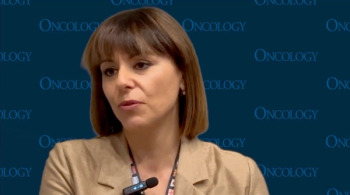
Oncology NEWS International
- Oncology NEWS International Vol 10 No 6
- Volume 10
- Issue 6
Epoetin Reduces Need for Red Blood Cell Transfusions
ROCKVILLE, Md-Epoetin alfa, or recombinant human erythropoietin (Epogen, Procrit), reduces the need for red blood cell (RBC) transfusions among cancer patients with chemotherapy-induced anemia, a report prepared for the Agency for Healthcare Research and Quality (AHRQ) concludes. Overall, the report found that epoetin appears most efficacious when it is initiated as falling hemoglobin (Hb) levels near 10 g/dL.
ROCKVILLE, MdEpoetin alfa, or recombinant human erythropoietin (Epogen, Procrit), reduces the need for red blood cell (RBC) transfusions among cancer patients with chemotherapy-induced anemia, a report prepared for the Agency for Healthcare Research and Quality (AHRQ) concludes. Overall, the report found that epoetin appears most efficacious when it is initiated as falling hemoglobin (Hb) levels near 10 g/dL.
The study reviewed the outcomes in published studies comparing epoetin with transfusion alone in patients with therapy- or cancer-related anemia. In the studies of transplant patients, transfusion supplemented with epoetin was compared with transfusion alone. The analysis of pooled data was carried out by the Blue Cross and Blue Shield Association Technology Evaluation Center Evidence-based Practice Center (EPC).
Among those patients whose anemia stemmed primarily from cancer therapy, studies show "adequate and consistent" evidence that epoetin increases hemoglobin levels compared with controls, and this finding held true in both pediatric and adult patients. "The most robust evidence that epoetin improves transfusion outcomes in these patients comes from trials in patient groups with baseline Hb of 10 g/dL or less," the report found.
The overall "number needed to treat" derived for patients receiving epoetin subcutaneously was 4.4, which suggests that 4 to 5 patients must be treated with epoetin to spare one patient from transfusion. However, double-blinded studies showed a smaller risk reduction than unblinded studies: numbers needed to treat of 5.2 vs 2.6.
"In unblinded studies, physicians may be more aggressive in transfusing patients in the control arm, thus overestimating the observed effect of epoetin," the report stated.
The study found strong evidence that epoetin improves quality of life in one randomized double-blind trial of patients with baseline Hb of 10 g/dL or less.
The frequency of adverse events associated with treatment does not appear to differ markedly between epoetin-treated patients and controls, the report stated. The only statistically significant difference was a greater frequency of fatigue in the control arms.
Cancer-Related Anemia
When a patient’s anemia results from the cancer itself, the review again found that epoetin increases hemoglobin levels; the evidence, although sparse, also indicates that treatment reduces the need for transfusions. All patients in the studies reviewed had nonmyeloid hematologic cancers or myelodysplastic syndrome.
Transplant Patients
In patients who undergo allogeneic stem cell transplants, epoetin consistently results in a statistically significant decrease in the time to red blood cell engraftment, the report said, and may decrease the number of red blood cell units transfused. However, the new study finds that epoetin is unlikely to spare such patients from transfusion because they are uniformly anemic following bone marrow ablation, and their response to erythropoietin, whether natural or recombinant, is not immediate.
Epoetin does not appear to increase the number of adverse events in these patients and has no significant effect on days of hospitalization.
There was no evidence to show that epoetin administered to patients who receive autologous stem-cell transplants has any beneficial effect on RBC engraftment, RBC transfusion, or length of hospital stay. No significant adverse events were noted in the autologous patients.
The report said that many questions remain to be answered about how to use epoetin. "Randomized controlled trials are needed to determine whether initiating treatment at baseline hemoglobin levels greater than 10 g/dL provides additional benefits in reducing the need for transfusions or improving quality of life," the report stated. "More research is needed on how to predict which patients respond to epoetin and to determine the most efficient doses and schedules."
Articles in this issue
over 24 years ago
ACS and NCCN Issue Cancer Pain Management Guidelines for Patientsover 24 years ago
Xeloda Approved for Metastatic Colorectal Cancerover 24 years ago
Walking Improves Fatigue, Sleep in Breast Cancer Patientsover 24 years ago
Bezwoda 1985 Breast Cancer Transplant Study Fraudulentover 24 years ago
Severity of Hot Flashes Worse in Breast Cancer Survivorsover 24 years ago
Tamoxifen Prevents BRCA2, But Not BRCA1, Breast Cancerover 24 years ago
High TIMP-1 Levels May Promote Prostate Cancer Growthover 24 years ago
Barriers to Colorectal Cancer Screening Among Minoritiesover 24 years ago
French Researchers Discover How HIV Makes First Contactover 24 years ago
‘Virtual Supercomputer’ Program for Cancer Drug DiscoveryNewsletter
Stay up to date on recent advances in the multidisciplinary approach to cancer.



































